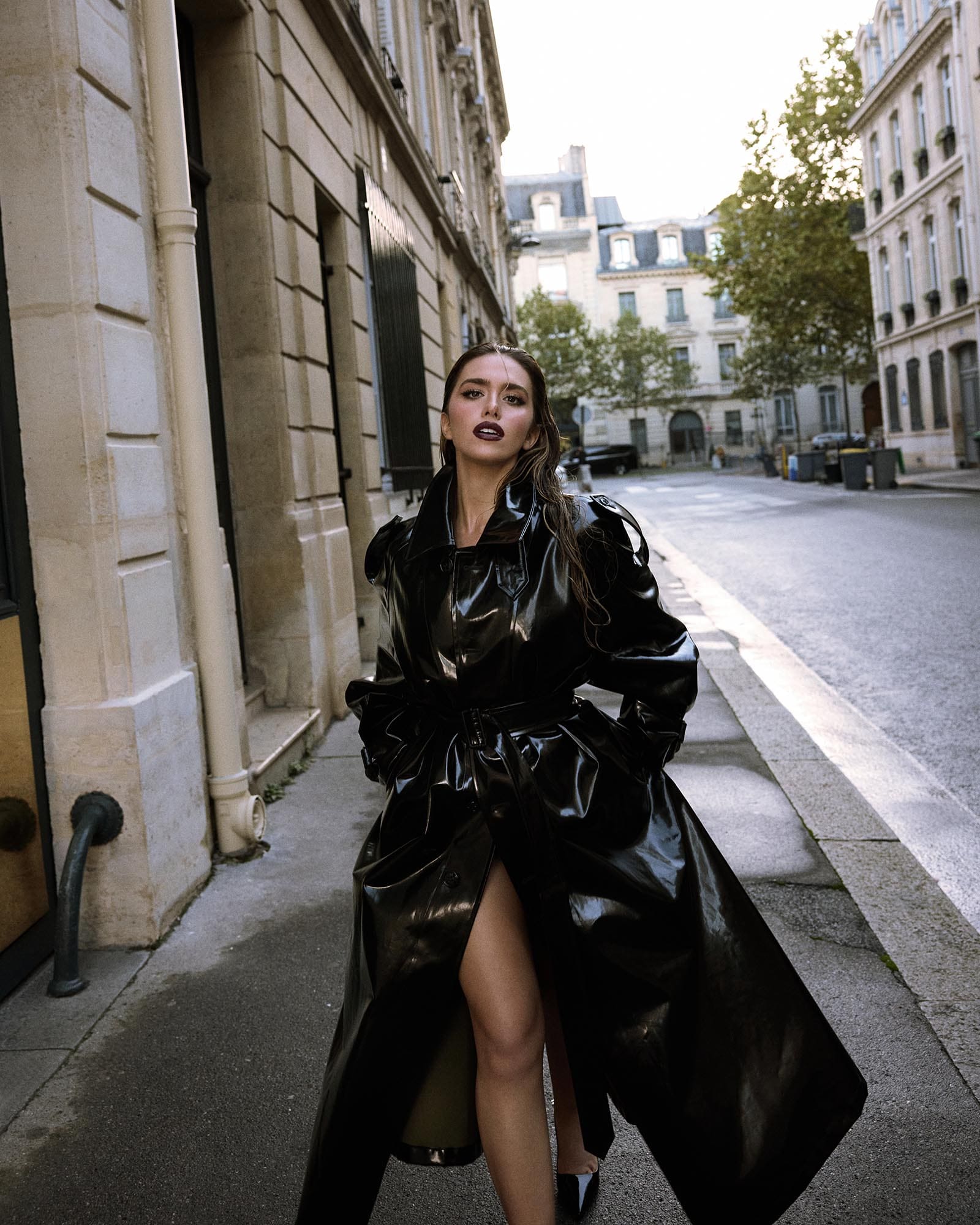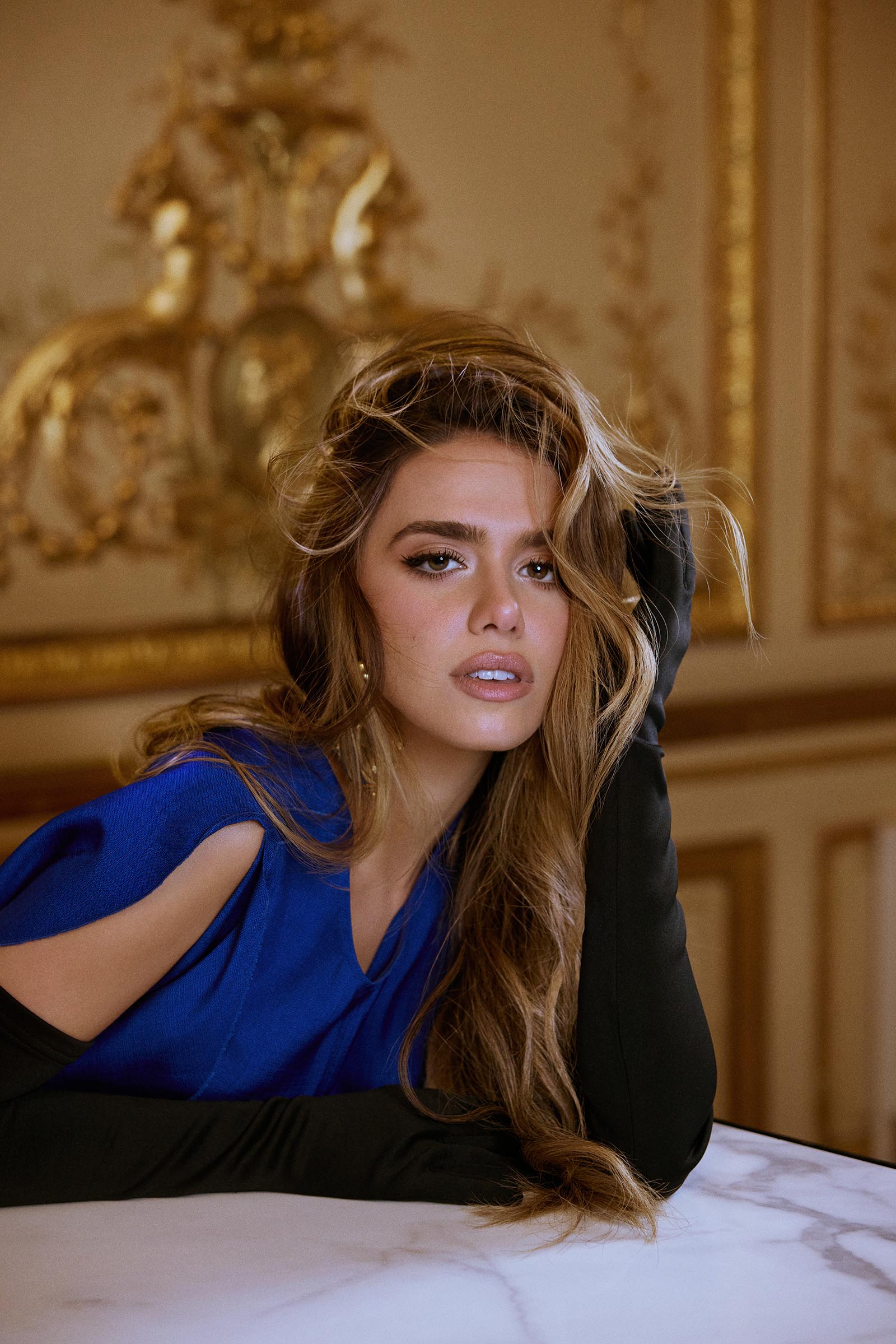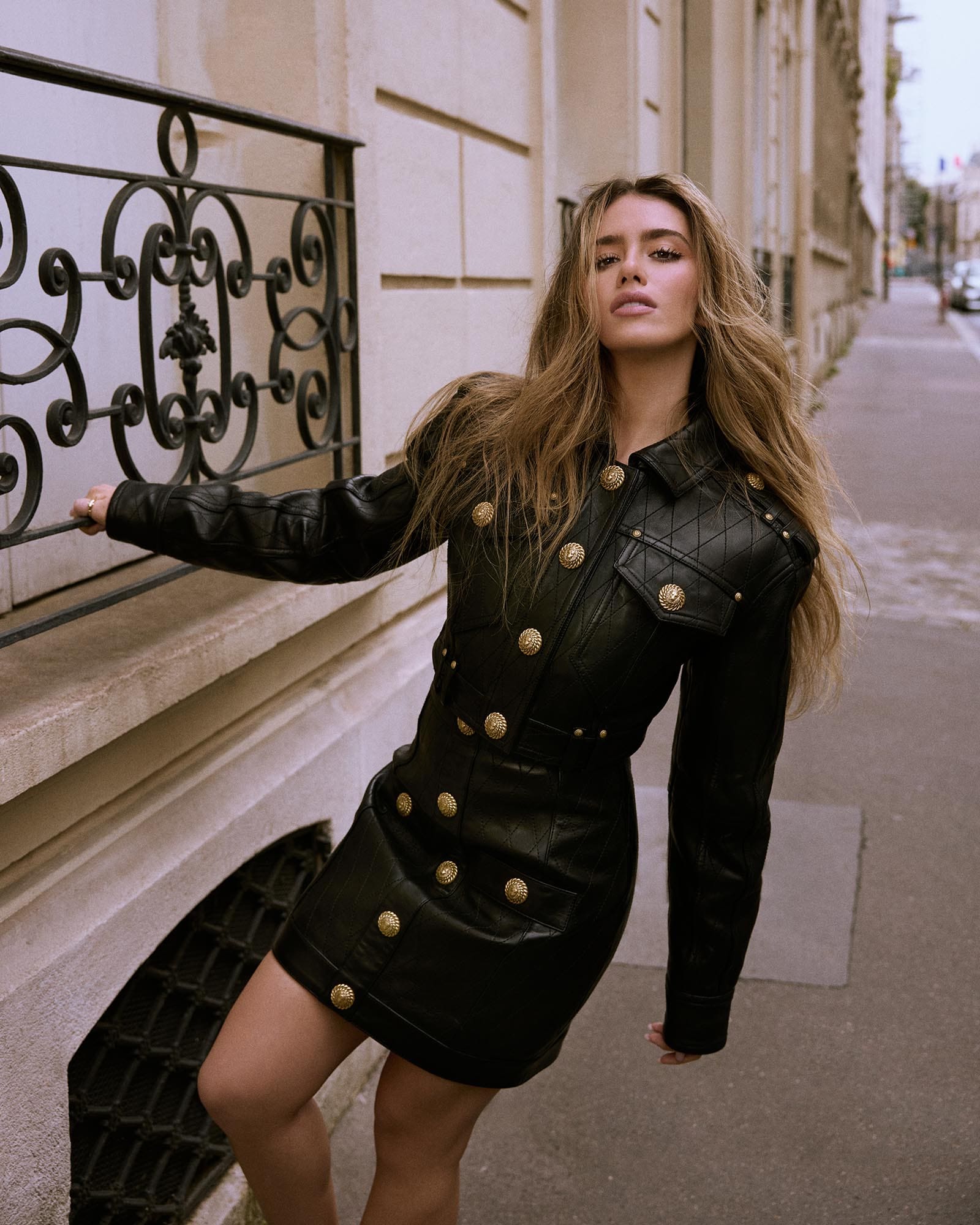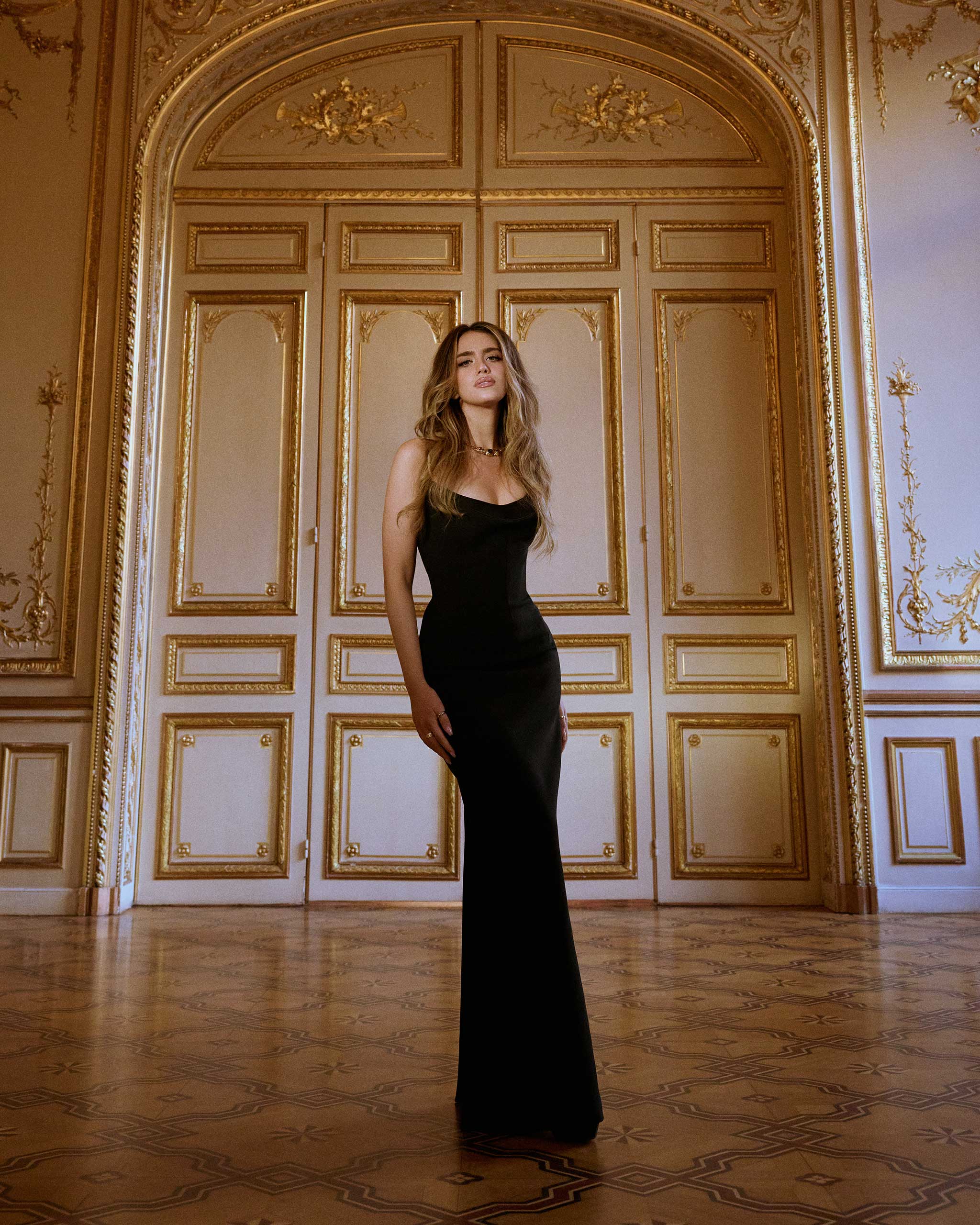Sarai wears a VERSACE dress. Photographed by Greg Swales
LatinX American singer-songwriter Sarai talks to Vogue Philippines about her childhood immersed in a vibrant medley of sound, losing her voice, and regaining it stronger than before.
Sarai’s earliest memory is of herself dancing. Picture her at three or four years old, bopping along to salsa and merengue with her parents in their Philadelphia home. When the mood would suddenly shift—first to ’80s classic rock, then to jazz, and another genre, and another genre—she would continue swaying, enveloped by pure sound.
This scene is how she would describe the way she grew into music and, subsequently, how she found her sound. “My mother is from Venezuela, South America, so [I grew up around] a lot of fun, upbeat music,” she smiles. “And then my dad is from New York. There’s a lot in American music, but we listened to everything from rock to pop to jazz and so many other genres.”
Today, her discography reflects that endless mixtape. Pulling from reggaeton, pop, and R&B, the Miami-born singer-songwriter crafted a category of her own making, one that reflects the “two worlds” she grew up around and the worlds she continually discovers for herself. “I grew up speaking both English and Spanish at home,” she tells Vogue Philippines. “So it was very vibrant cultures all throughout my childhood, which gave me a big appreciation for wanting to learn about other cultures as well.”

To Sarai, music becomes a sort of language that, as her artist description reads, has “the power to move people.” “I think no matter what kind of language you speak, where you are from in the world, music completely transcends that,” she explains. “You know, we have the ability to feel emotions with music that I think we feel in very few other mediums. And I think for me, music has been not only such a healing thing for me but is something that has brought so much joy into my life.”
When Sarai lost her voice in her battle with Lyme Disease, music became the language she relied upon. “I had it for 12 years. I didn’t know what it was, and my body was kind of slowly deteriorating over time,” she recounts. “Although I couldn’t sing, I would sit down at the piano and write music. And I said, you know, right now, I don’t feel great. It’s not a great moment, but I am going to sit here and do what I love. And in that way, I built myself back up.”
The songs she wrote then would bring her to several revelations, but one of the most prominent, she says, is that “music has such a special ability.” In many ways, her medium and messaging became one and the same. Sarai expands, “I want to be able to transmit my feelings, and my, you know, joy, or my sadness, or whatever it may be, through music, so other people around the world can connect with me.”

She finds clarity between the lyrics that extend from her fingertips and onto the page or over her piano, reflections on what she feels in the present moment and perspectives on what her life could become. “That’s how I wrote my first album, Sarai,” she says. “It was basically the story of a girl who felt kind of broken and, you know, didn’t really know who she was, slowly building herself to ‘Candela,’ which is the last song of the album [about] feeling this fire and passion for what you love to do and feeling like a new, reborn person.”
Her latest album La Dragona, set for release at the end of this year, is a compilation of songs she’s been saving since her break from music in 2021. Its process of writing mirrored her journey of self-actualization, allowing each song to evolve over time. This includes her single “Don’t Sleep On Me,” which she wrote five years ago during her freshman year of college; it’s Sarai’s first single almost entirely in English. “It blends my two cultures, and, I think, feels very authentic to who I am as a person,” she says. “We gave it more of a dance feeling, which was also a little bit of a different style for me.”
La Dragona taps into sounds that she’s introducing to her discography for the first time; she tells Vogue that a good amount of the songs feel different from their first demos. “I feel like each song itself takes a new life, and it almost becomes its mini world,” she muses. “For me, each song is a concept, and it has its own meaning and its own stories.”

Sarai hints at one of her favorites on the album, describing it as an “ode to the powerful woman” that her mother and grandmother taught her to be. Confidence is a running theme in her music; perhaps it’s only natural when her evolving playlist cites Cuban singer Celia Cruz to the soulful crooning of Ella Fitzgerald and Aretha Franklin, through to pop phenoms Madonna and Beyoncé. Just as she felt listening to them, “I want people to feel that excitement and that happiness when they hear my music. I want them to feel like their powerful, confident selves,” she says. “Like they can do any and everything in this world.”
The desire to impart this sense of empowerment comes from experience: Sarai knows what it’s like to find it herself. Since losing her voice, she’s gained it back stronger, building to a collective 7.2 million streams on Spotify and 30 million views on YouTube. With the release of La Dragona later this year, she looks forward to sharing everything that will come along with it, including its music videos, behind-the-scenes content, and, soon, going on tour.
Still, she feels she’s not done growing. There are “so many things” to translate to distinct sound, many more worlds she’s yet to uncover. “I think every single day, I learn another lesson,” she reflects. “And I would say, if you stop learning, then that means you need to get out of your comfort zone.”
Photographs by Greg Swales. Creative Direction by Taylor Angino. Styled by Katie Keim. Talent: Sarai. Hair and Makeup: Victor Gaudarrama. Producer: Alexey Geltskiy.
- Mis(s)education: How Morobeats Sister Act Miss A and Fateeha Reintroduces Mindanao Culture to the World
- Music, Wine, and Candlelight: Noname Wants to Breathe New Life Into Third Spaces
- Soul Searching: KZ Tandingan on Being a Child of Digos and Opening the World to Mindanao Music
- Raising the Bars: Nina Lee Aquino Directs Prison Dancer, Canada’s First-All Filipino Musical Production
